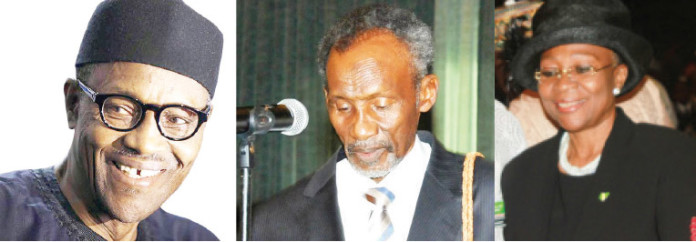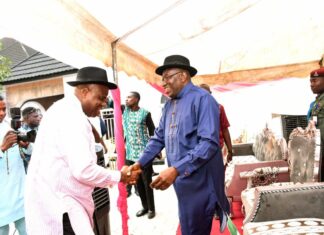As President Muhammadu Buhari marks one year in office, Senior Correspondent, ONYEWUCHI OJINNAKA, x-rays the judiciary, corruption cases and the rule of law under his administration.
Muhammadu Buhari was inaugurated on May 29, 2015 as the President and Commander-in-Chief of the Federal Republic of Nigeria. Today, he is one year in office. Within the one year, TheNiche recounts the events that prevailed when it comes to the judiciary, corruption cases and the rule of law.
On the positive side, TheNiche recorded the appointment of new judges by Buhari to solve the problem of inadequate judges in various courts across the country. Also disciplinary measures/sanctions were meted out on errant judges and sanctity has crept into the judiciary as a result of the anti-corruption stance of the government.
On the negative side, the federal government is criticised for disobeying order from competent courts of jurisdiction, particularly on electricity tariff, release of former National Security Adviser (NSA), Sambo Dasuki, and Indigenous People of Biafra (IPOB) promoter, Nnamdi Kanu, from detention despite perfecting their bail conditions. The first one year witnessed verbal attack on the judiciary by Buhari.
In one of his many public outings, specifically at the All Nigeria Judges Conference in Abuja, Buhari reportedly made uncomplimentary remark on the judiciary by saying that the judiciary and Independent National Electoral Commission (INEC) were his worries in his anti-corruption war.
In another forum, he appealed to judicial officers to be pro-active and help in his efforts to eliminate corruption from the Nigerian society. He was apparently not comfortable with allegations of judicial corruption, tactical delay of cases by lawyers with alleged collusion/consent of judges and negative perception arising from long delays in the trial processes.
His fears were anchored on his perceived slow performance of the courts saddled with corruption cases.
Before he assumed office as the President, the dearth of judges at both federal and state high courts was so disturbing because it affected quick administration of justice. Then, most cases, including corruption cases, suffer incessant and long adjournments.
Appointment of judges
To address the problem of shortage of judges at federal and state high courts across the country, about 75 new judges were appointed. Their appointment was to ensure decongestion of prisons and quick disposal of cases pending in courts.
At the induction course for the new judges and khadis organised by the National Judicial Institute (NJI), Abuja, Chief Justice of Nigeria (CJN), Mahmud Mohammed, did not mince words when he cautioned the judges to adhere strictly to code of conduct. He reminded them of the dire need to live up to expectation by discharging their statutory duties expeditiously.
Warning that judges who fail to deliver judgment within the provisional 90 days risk sanction by the National Judicial Council (NJC), the CJN noted that the judges must always comply with the provisions of Section 294(1)and (6) of the 1999 Constitution.
The section stated that judges must deliver judgments within 90 days of completion of parties’ final addresses.
“Failure to abide by these statutory orders amounts to misconduct,” he warned.
Mohammed charged the new judges to be diligent, maintain high standard, watch their lifestyles and avoid any act capable of betraying them as judges.
Anti-graft war
Making reference to President Buhari’s anti-corruption war with regard to their appointment as judges, the CJN said: “Your appointment to the bench as judicial officers comes at a crucial time in the history of our beloved country, as we pivot our fortune in a serious war against corruption which has been a huge impediment to the nation’s growth.
“I urge you to avoid any type of corrupt practice, so as to maintain your integrity as a judge.”
In her address, the administrator of the institute, Rosaline Bozimo, informed the new judges that their jobs as judicial officers demand them to be “courageous, fearless, candid, uncompromising and firm in upholding the rule of law” as they strive to attain judicial excellence.
Lawyers’ appraisal
Speaking on anti-corruption and the rule of law, Lagos lawyer, Ajibola Oluyede, said the Buhari “administration professes to be law-abiding and interested in the rule of law”, admitting that it had taken pains to follow due process in some areas.
It appears that some tactics are being employed, he said on anti-corruption war, pointing out: “They came with trumped up charges, filing charges against someone before investigations are conducted or even concluded; indefinite detention of people on the basis of an illegal and unconstitutional provision in the so-called Criminal Justice Act.”
Oluyede asked the administration to look into the issues of general approach to law enforcement, especially in respect to the fight against corruption which gives the impression that people are found guilty even before evidence is gathered.
“These issues should be quickly resolved in their second year in office, otherwise there would be a great chaos from what I can see in the system,” he said, adding that the tendency to intimidate the judiciary should be avoided.
Another lawyer, Charles Mmarkwe, told TheNiche that the one year was an uphill task for the judiciary, given the environment the officers found themselves and the environment under which they ought to operate.
According to him, so much has not been done, though there is semblance of hope.
Mmarkwe said: “When the judiciary is poorly funded, when personnel are not there to actually do the work, and when resources are not provided for effective and efficient work, it would be quite difficult to get the judiciary to perform as it should.”
He, however, prayed that with the passing of the budget as it affects the judicial arm of government, and if fully implemented, there would be a semblance of hope.
The lawyer also noted a lot of monitoring of the judges’ performance and conduct by the NJC “as can be seen from recent decisions of NJC”. He was optimistic of seeing a better judiciary subsequently.
He posited that the executive arm of government should be at the driver’s seat when it comes to corruption, “though the judiciary must also purge itself of corrupt tendencies and practices”.
On perceived corruption within the judiciary, he said there were still judicial officers lower in the rank who are not above board, saying that the fight should be taken to the domain of not only the judges but the personnel within the ladder and see how better things can be done for Nigerians.
Another lawyer, Godwin Okaka, said under the present dispensation, the judiciary has not performed badly.
The new administration, he said, cast aspersions on the judiciary, expressing that it is unfair to the judiciary and its stakeholders.
On the rule of law, he decried the government’s disobedience to court orders, pointing out that the “judiciary will not find it comfortable or funny”.
“The level of compliance has not been proper. They have not complied properly because there are instances where a court of competent jurisdiction has made an order and it is not complied with by the powers-that-be,” he said.
For Economic and Financial Crimes Commission (EFCC) counsel, Anselm Ozioko, the best approach to fight corruption is to deny bail to those charged to court for corrupt cases. The refusal of the bail will facilitate speedy hearing and disposal of cases.













